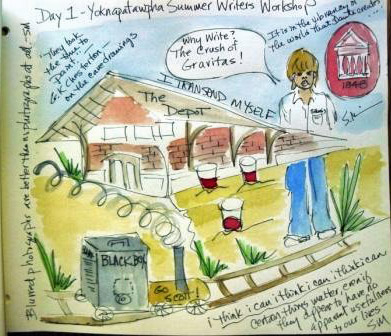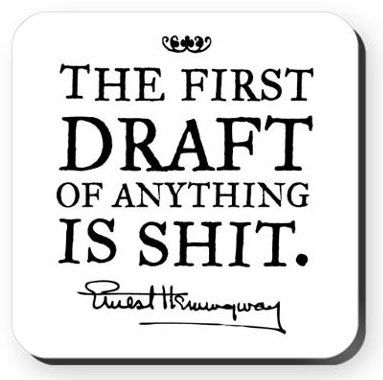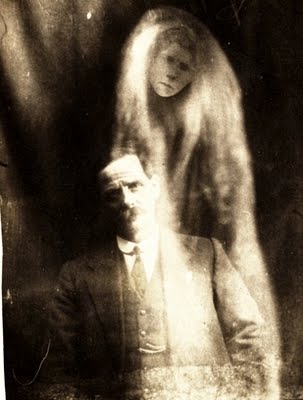 I love historical fiction. But I especially like books that bend the genre a bit by speculating on stories that COULD HAVE happened in any given setting. Of course that’s what I’m doing with my novel, Cherry Bomb. My protag is fictional, but she interacts with some real, historical folks. The plot is moving along as I continue to ask, “What if?” Even in this late stage of revisions, new things are happening to the characters.
I love historical fiction. But I especially like books that bend the genre a bit by speculating on stories that COULD HAVE happened in any given setting. Of course that’s what I’m doing with my novel, Cherry Bomb. My protag is fictional, but she interacts with some real, historical folks. The plot is moving along as I continue to ask, “What if?” Even in this late stage of revisions, new things are happening to the characters.
 In a few weeks I’ll be participating (for the 7th time) in a wonderful writing workshop in Oxford, Mississippi. (REGISTER for the YOK Workshop NOW!) Although I’m still working with an editor on Cherry Bomb revisions, I’m taking a little time to explore a new novel. This time the fictional and historic characters are hanging out in Charleston, South Carolina, and New York City. And of course art is involved. Probably will always be involved in my novels. The story (working title is Red, Silver and Black) involves famous artists and questions of the authenticity of a mysterious painting. I’m having a blast doing research. But I’m also asking, “What if?” as I explore events that could have happened. And by following my instincts about the characters’ lives, I hope to get to the emotional truth without worrying about the facts.
In a few weeks I’ll be participating (for the 7th time) in a wonderful writing workshop in Oxford, Mississippi. (REGISTER for the YOK Workshop NOW!) Although I’m still working with an editor on Cherry Bomb revisions, I’m taking a little time to explore a new novel. This time the fictional and historic characters are hanging out in Charleston, South Carolina, and New York City. And of course art is involved. Probably will always be involved in my novels. The story (working title is Red, Silver and Black) involves famous artists and questions of the authenticity of a mysterious painting. I’m having a blast doing research. But I’m also asking, “What if?” as I explore events that could have happened. And by following my instincts about the characters’ lives, I hope to get to the emotional truth without worrying about the facts.
 At this crucial stage of getting the (“shitty”) first draft down, I’m trying to remember the advice I’ve heard over and over from successful authors about not listening to any editorial voices. That advice was repeated recently in a short piece by Jill McCorkle in The American Scholar: “Writing Without Worry.” Here’s a sample:
At this crucial stage of getting the (“shitty”) first draft down, I’m trying to remember the advice I’ve heard over and over from successful authors about not listening to any editorial voices. That advice was repeated recently in a short piece by Jill McCorkle in The American Scholar: “Writing Without Worry.” Here’s a sample:
The first draft should bring with it all the freedom in the world…. All the worries about where the material may have sprung from or what so-and-so might think can be dealt with later. Those editorial changes are usually quite simple once you have lassoed the emotional truth of what you are trying to tell.
Yes! That’s exactly what I’m trying to say. And of course, Jill McCorkle says it well. I love her writing. It was a joy to see her again at Burke’s Books last April when she gave a reading from her tenth novel, Life After Life. I first met Jill in 2009, when she read from her award-winning essay, “Cuss Time,” at the 2009 Conference on Southern Literature in Chattanooga, Tennessee. I knew then she was a writer’s writer—one who leads the rest of us along the path.
 Back to work now. If you’re writing today, remember Jill’s words about those ghosts standing over your shoulder while you work:
Back to work now. If you’re writing today, remember Jill’s words about those ghosts standing over your shoulder while you work:
Whoever that person may be: teacher, preacher, spouse, friend, foe, get them out of your space.
And… at the 2008 Yoknapatawpha Summer Writers Workshop, author Jere Hoar talked about the “watcher in the shadows” which is like the ghost that Jill talks about. He told us:
The watcher kills your ideas. He says, ‘Make that softer’ and ‘Round that a little.’
And then he quoted the philosopher, Friedrich Schiller:
The watcher rejects too soon and discriminates too thoroughly.
Here’s to writing that story without letting the ghosts and watchers into your space! Get those lassoes out and grab that truth!
I’d met Jill earlier, but I have to say “Cuss Time” made me laugh until my sides hurt. I’m a fan, so glad to hear you invoke her name when you bring up writing advice. Best wishes on your new project!
Thanks, Diana. Cuss Time cracked me up, too. But it was also terrific writing.